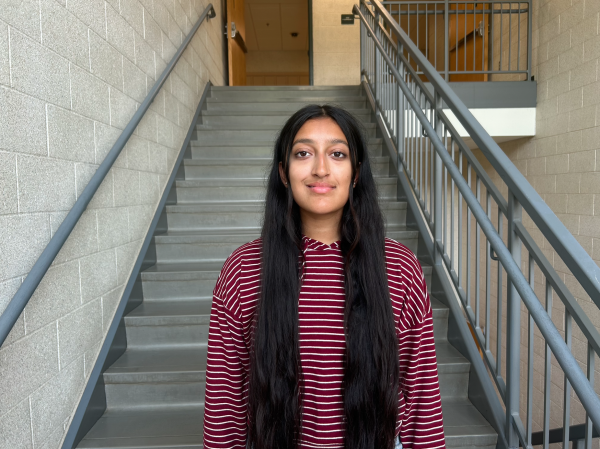Students compete in Poetry Out Loud Finals
February 14, 2022
Six students competed in the Poetry Out Loud finals on Tuesday, Jan. 25, with junior Mariana Oliveira placing first.
Nearly 400 students recited poetry for their classes, but the competition quickly narrowed down to just six finalists: seniors Shrutika Kumar and Emma Belfer, juniors Mariana Oliveira and Sonya Libman and sophomores Isabella Palit and Sasha Sheydvasser. Kumar and Belfer placed second with 263 points each. Oliveira prevailed with 269.5 points, moving on to represent Algonquin at the regional competition on March 12.
“I was shocked when they called my name as the winner,” Oliveira said. “I honestly wasn’t even planning on competing in the first place, so by no means did I expect to be the finalist.”
Oliveira performed “Truth is I would like to escape myself” by Nour Al Ghraowl and “Summer” by Chen Chen. She said she wouldn’t have participated in this competition had it not been an assignment for English. Many finalists share the same sentiment.
“I am glad I participated in the competition; it was a fun experience, and I don’t think I would’ve done it if it wasn’t an assignment for English,” Kumar said, who performed “How to Triumph Like a Girl” by Ada Limon and “After Apple-Picking” by Robert Frost.
Meanwhile, Palit, performing “Cartoon Physics, Part 1” by Nick Flynn and “The Lost Land” by Eavan Boland, did not participate for an assignment or extra credit.
“I snuck into the junior/senior tryout,” Palit said. “None of my classes were doing Poetry Out Loud, and I wanted to, so I kind of just walked right in and it was fine.”
English teacher and Poetry Out Loud organizer Lauren Frantz believes this event isn’t just about reciting poetry and trying to win.
“Poetry can be something that’s very meaningful and comforting, and when people memorize poems, you kind of keep them with you, and they can provide advice, comfort, entertainment or even make you feel better anytime because it’s always in your head,” Frantz said.
The contestants were evaluated on their physical presence, voice and articulation, dramatization and evidence of understanding by a panel of judges.
“It is my third or fourth time judging, and I really love it,” science teacher and judge Brian Kelly said. “I think it’s a great opportunity for the kids to be able to show what they can do talent-wise, but also it’s fun to hear the students’ own interpretations of the different poems; it’s just a really cool event.”
Accuracy is a key factor of the overall score, which requires reciting the poem exactly word for word for full marks.
“I would stand in the mirror and recite the poem over and over again and do the actions to make sure I didn’t look ridiculous,” Libman said, who recited “Then and Now” by Tom Clark and “Catch a Little Rhyme” by Eve Merriam.
“After I had the poem memorized, I would go to my sister, and she would make sure that I was reading it word-for-word correctly,” Oliveira said.
Although repetition is key for memorizing poems, it comes with some challenges.
“The hardest part of the whole process of preparing was trying to keep the fun aspect in the performance,” Belfer said. “I was reciting the poems over and over again and didn’t want to lose the emotion and performing aspect of the poem in the monotony of repetition.”
Belfer performed the poems “the world is about to end and my grandparents are in love” by Kara Jackson and “Mingus at the Showplace” by William Matthews. Belfer explained that she chose poems that she connected with and could relate to.
“I chose ‘Mingus at the Showplace’ because the first line was ‘I was miserable of course, for I was 17,’ and me being 17 and miserable sometimes, I thought ‘I can work with this,’” Belfer said.
Each finalist recited two poems, and there seemed to be a common theme on which poem students recited first and last.
“I was thinking ‘what note do I want to end on?’ while choosing the order of my poems because my first one is insanely depressing, so I did my more positive poem last” Sheydvasser, who performed poems “I felt a Funeral, in my Brain” by Emily Dickinson and “Wonderbread” by Alfred Corn, said.
Libman also decided to save her lighter poem for last and to perform her more melancholy poem first.
Frantz believes the competition is valuable for many reasons.
“I think the most valuable thing is if students can find a poem that really speaks to them and to really connect with that poem,” Frantz said. “Maybe [the poem] makes them see the world in a different way or makes them see themselves in a different way. I also think [Poetry Out Loud is] a nice opportunity for a group of kids who maybe don’t get to spend a lot of time in the spotlight; it seems like it’s sort of its own special skill that’s a little bit different from theater or drama.”
Kumar encourages more people to step out of their comfort zone and participate in the event.
“I think more people should try Poetry Out Loud and not write it off so quickly,” Kumar said. “Participating in the event made me think I should try new things and get out of my comfort zone because I actually had fun reciting those poems, and I really didn’t think I would.”










